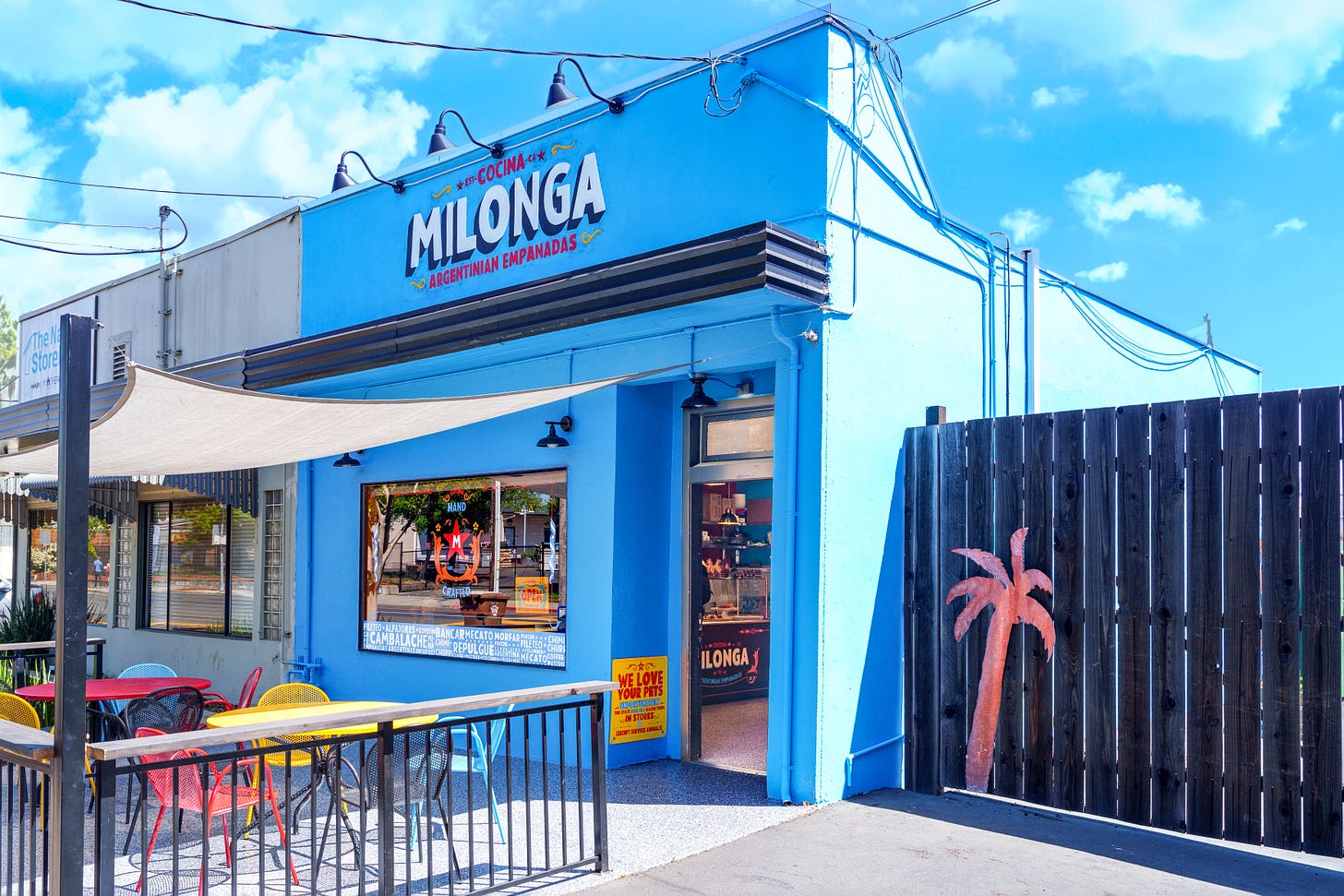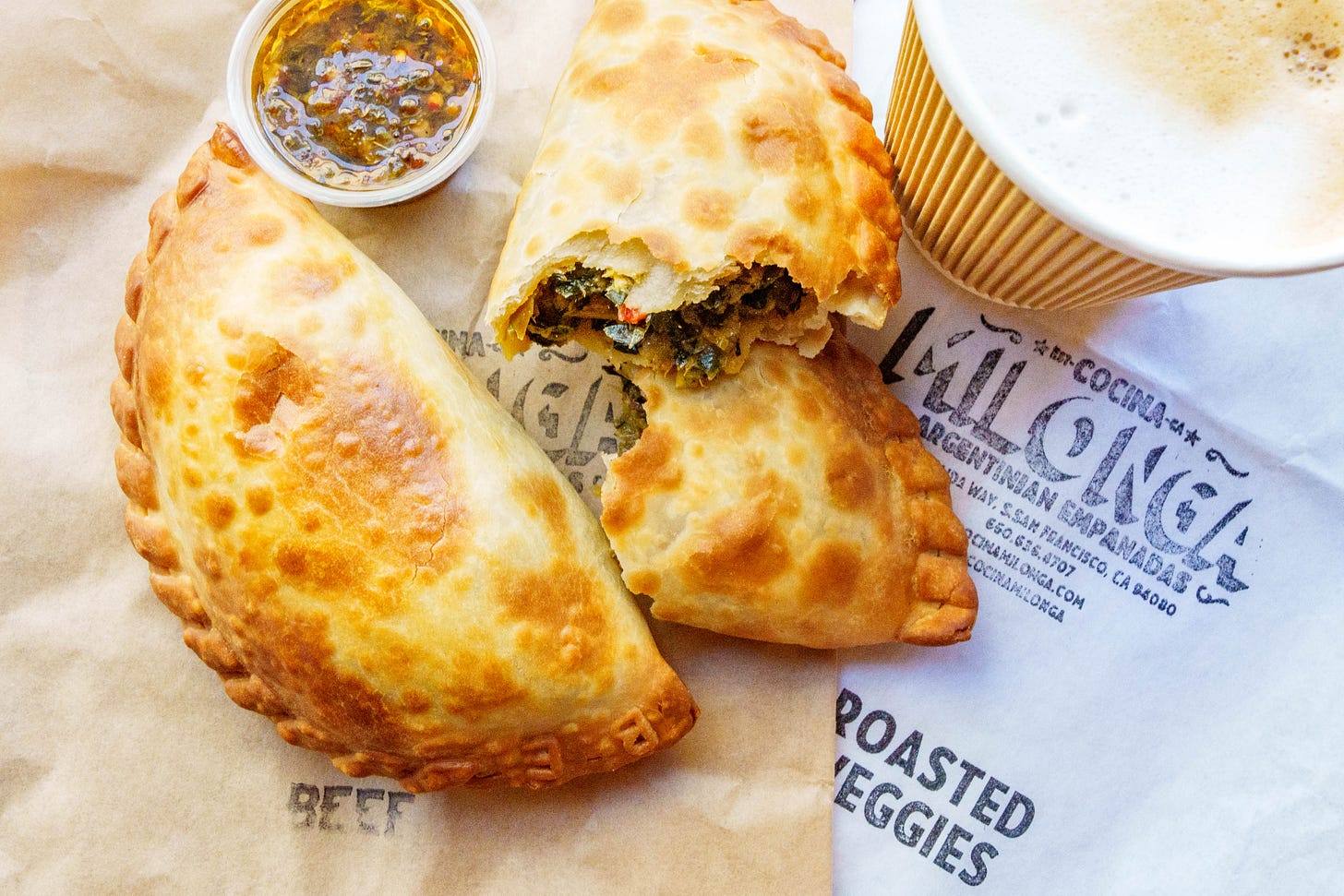NAPA, Calif. — Venturing off well-trodden roads is often the path to culinary adventures. Case in point: Napa’s new Cocina Milonga, purveyor of Argentinian empanadas and pastries and just possibly the best cup of coffee in town.
After you find Yajome Street, it’s hard to miss this new cafe and shop. Its sky-blue exterior and colorful patio furniture beckon visitors into a vivid red and yellow interior to be greeted by lively music, a warm welcome and this painted greeting: Un café para despertar; una empanada para sonreir (a coffee to wake up, an empanada to make you smile).
Cocina translates as “kitchen,” and milonga is a musical genre that originated in South America, considered the precursor to the tango. Hence, you might say it’s the dancing kitchen, a bit of Argentina on a Napa backstreet.
“It’s a totally different experience from what Napa is used to,” said Ricardo Castano, chef and owner, who along with his business partner, Raul Leiva, opened Cocina Milonga this spring. “Colors give you happiness.”
Castano, originally from Colombia, trained as a chef at the Cordon Bleu in Paris and came to the United States in 1997. Here he met Leiva, who had come from Cordoba, Argentina, and who also had professional chef’s training as well as the background of a cooking family.
“We’ve been friends for 32 years,” Castano said.
In the United States, as they cooked in restaurants, private homes and catering, they shared a dream of starting their own business.
“Maybe it is not everybody’s dream,” Castano said, “but it was ours — to bring family cooking to others,”
After a brief stay in Florida, he settled in Yountville.
“I fell in love with Napa Valley,” he said.
By 2015, he and Leiva were ready to launch their business. Making and selling empanadas was a natural choice. These savory crescents of dough molded around a variety of fillings are thought to have originated in Galicia in northwestern Spain, but they are also popular throughout Central and South America and especially, Castano said, in Argentina. The name comes from the Spanish empanar, one meaning of which is “to bread.”
Flavorful dough, generous filling
Empanadas have counterparts in cuisines around the world: Eastern European piroshki, Greek kreatopitakia, Italian calzones, Indian samosas, Ashkenazi Jewish knishes, Mongolian khuushuur and, in the United Kingdom Cornish pasties. All are tidy and make easy-to-transport snacks or lunches that are also delicious.
When Castano and Leiva decided to combine their chefs’ training and family traditions to create their empanadas, they first researched other versions being sold in the United States, including in Florida, where they are popular among the large community of Latin and South American residents.
“Some are so much dough and so little filling,” Castano said. “We wanted a flavorful dough and a generous filling — that would also be affordable.”
With their wives, the two chefs devoted “hours and hours and hours” to testing and revising their recipes. The result is a tasty pastry, not too thick, filled with one of 13 different fillings, some traditional and others their own inventions.
Great location
With their menu set, the next step was finding a place to make and sell them. They began preparing them in south San Francisco, selling the empanadas in a storefront there as well as in farmers markets. Their product’s popularity grew, and they opened a concession at San Francisco’s Chase Center. Ready to open a second shop, they decided it would be in Napa. Navigating the challenge of finding affordable space in the city brought them to Yajome Street.
“It’s a great location,” said Castano, who did much of the renovation work himself while Leiva handled production in the city. Just down the street, he noted, is Rancho Gordo, where Steve Sando sells his famous beans.
The empanada choices at Cocina Milonga range from simple ham-and-cheese or bacon-and-egg filling to an original mix of crimini mushrooms with shallots, thyme, creme fraîche and mozzarella cheese.
The staff is exceptional. Friendly and knowledgeable, they are happy to share explanations and recommendations. Beef with raisins, olives and hard-boiled egg is a classic, as is the empanada filled with Argentinian chorizo, Provolone and chimichurri, the condiment especially complementary to meats. Chicken with onions, peppers and paprika is a popular choice, and the tuna with tomato frito sells out swiftly.
Vegetarian filling choices abound. The potato empanada is made with kalamata olives, green peas and tomato. The spinach filling gets a kick from caramelized onion and smoked mozzarella. Inside the humita empanada one finds butternut squash, corn and cheese, while the sweet potato empanada contains onions, black beans, cayenne pepper and Monterey and cheddar cheeses.
Also worth investigating is the fugazetta, containing roasted onions, white cheddar and mozzarella, and a roasted-veggie empanada made with kale, green garbanzos, almonds, garlic and sherry vinegar. Two fruit versions of empanadas are apple and pineapple, and like the roasted veggie and potato empanadas, these are vegan-friendly.
The empanadas, all $4.75 each, are prepared in San Francisco and brought to Napa, where they are warmed up to order. They are also available to go, frozen in packages of four for $18.
But wait, there’s more
In the course of an interview, Castano served up a smooth, rich cup of coffee made from beans from another small family business, Proyecto Diaz, based in Oakland and owned by Fermando Diaz and his family. Originally from Oaxaca, Mexico, Diaz calls his work “caffeinating with a purpose” — to support small farmers around the world from whom they import the beans that are roasted locally. It is one fine cup of coffee, available in hot and cold choices. Other beverages include sipping chocolate and maté, the caffeine-rich South American herbal drink made from yerba mate and traditionally served in a gourd calabash with a metal straw. The coffee bean maté is also available in packages, and if you need a calabash for your maté, you can find one here, too.

And not to be overlooked are the Argentinian pastries, which come from Lolita’s Artisanal Bakery in San Mateo. This enterprise is owned by Silvia Browne, Leiva’s sister-in-law, who along with other family members, helped their mother, Lolita, launch the enterprise.
Lolita’s enticing selection includes alfajores ($3.50), sandwich-style cookies filled with guava, chocolate and dulce de leche, glazed with honey or dark chocolate. Cañoncitos are puff pastry horns filled with whipped cream or dulce de leche ($4). Fresh fruit tarts ($5.50) have seasonal fillings. The pasta frola ($4.75) is a pie filled with guava paste, and milhoja, is puff pastry layers filled with dulce de leche (which is also sold by the jar). The star of the sweets, however, is the luscious Pastel de Gloria ($4.75), filled with both guava and dulce de leche.
“It is all from our family to yours,” Castano said.
Cocina Milango is open seven days a week, Monday through Friday from 7 a.m. to 5 p.m. and Saturday and Sunday from 9 a.m. to 4 p.m., at 1740 Yajome St., Napa. For more information, visit Cocina Milonga or call 707-927-5426.









